Yesterday was the Eugene Permaculture Guild’s annual Spring Seed Swap. Every year, hundreds of gardeners and seed savers convene for a few hours on a Saturday to share seeds, plants, and a potluck meal. The event is more than the free gifting of seeds, though, and has become a pivotal community event for the local gardening scene.
This year was the Seed Ambassadors Project’s first appearance at the spring seed swap, and we brought two grocery bags filled with seed that we have saved in the past few seasons. By the end of the day these bags were whittled down to one tenth of their original quantity. It is so great to think of so many local gardeners growing locally saved seeds! Of course, we did not come away empty handed, as we gathered samples of some locally saved tomatoes, orach, mustard, a gourd, a salsify, a parsley, a root parsley, and a blue flat leafed kale that we are really excited about.
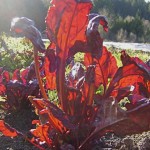
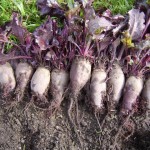
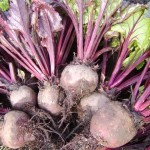
Joy Larkcom’s Bull’s Blood Chard, Ukrainian Beet, Kamuoliai 2 Beet (from Lithuania)
We believe that it is essential that home gardeners and farmers save seed to preserve genetic diversity. It is apparent that even small seed companies are unable and/or unwilling to do so, as they must respond to the forces of the market and whims of the large seed companies. Locally stewarded seed is of course optimal, though national seed saving networks, such as the Seed Saver’s Exchange, are also very excellent in this regard. One of the goals of the Seed Ambassadors Project is to encourage local seed saving. Each time a variety of vegetable is saved in a particular bioregion (or microclimate or garden), it adapts to the specific conditions of that place. Ultimately, food sovereignty begins with seed sovereignty.
As we have mentioned in previous posts, our seed quest last winter resulted in the collection of more than seven hundred varieties of seed, many not available in the United States. Added to this amount are the fifty or so varieties we collected this year in Romania, and a few dozen other varieties collected by other friends Seed Ambassadorizing in Mexico and Italy. While we are doing everything we can to grow out as many of these varieties as possible in our own large seed garden, isolation distances required by many biennial outbreeders (beets and chard, brassicas, onions and leeks, parsnips and carrots) severely limit the amounts of these species we can grow out to seed in any given season.
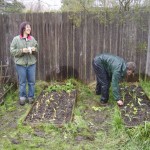
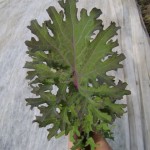
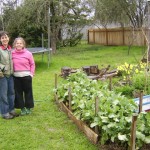
Sarah and John Herberg with some onions, Russian Hunger Gap Kale, Alison Kinney with Sutherlin Kale
Last year we grew several of each of these species, not quite knowing how we would isolate them this year for flowering and seed production. Several people have contacted us through our website and offered to help (thank you!), and we are trying to plug these people in as much as possible.
We decided to develop a Local Seed Stewardship Initiative, with the twin goals of providing necessary isolation distances for the outcrossers we grew, and involving more gardeners (and gardens) in town with seed stewardship. We launched it yesterday at the seed swap with almost immediate success.
We dug up two beets, four parsnips, four onions, several kales, a winter radish, and two rutabagas/swedes. We put them in buckets and totes and bags, and brought them to the swap with the hopes of finding home gardeners to adopt a variety to grow out to seed this year. At first it was a bit slow, with only a flier buried under all of the seeds we brought with us asking for help. But when Kayla decided to bring in a Delaway Cabbage plant (a beautiful broad-leafed kale we collected in Ireland) and make a sign that read “Adopt a Kale!”, people started lining up to offer their garden space and get involved in the initiative. Within an hour all of the plants we brought with us had found homes in gardens in Eugene!
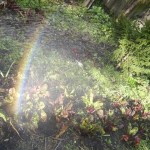
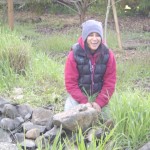
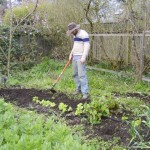
Kamuoliai 2 Beet in Nadia Raza’s garden, Nadia, Andrew transplanting Sugar Loaf Chicory
We are of course really excited about the eagerness of home gardeners to get involved in seed stewardship here locally. Some of these people have never saved seed before, and we are especially pleased to have them on board. By having seed gardens in so many people’s homes, their friends and neighbors are also exposed to the concept and process of seed saving, which is an added bonus.
Over the course of the season we will visit each of these gardens several times and offer whatever guidance our new friends need to get these plants safely to seed. In exchange for growing out a seed crop for us, we are also offering them whatever seed they want from our collection of seeds we increased last season.
We hope to grow more biennials through their first season this year, and extend the network of local seed stewards next season. To this end we are also organizing a Seed and Plant Faire at Aprovecho in Cottage Grove on May 3 that will include seed saving and winter gardening workshops. We are also planning a meeting of people in the area that are already active seed stewards, with the potential of establishing a local seed bank. More about this gathering soon.
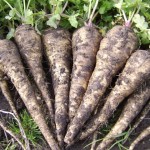
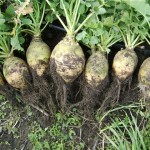
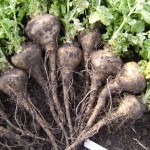
White Spear Parsnip, Nadmorska Rutabaga, Kral Russian Parsnip
The Local Seed Stewardship Initiative came together as a way for us to facilitate meeting needs of seeds and the local community. It is so good to think about what the Seed Ambassadors Project has become in the year and a half since we started, and what it might become in the future as it continues to respond to the needs of the seeds and the community.
Here in the western communities of the Portland area, namely Forest Grove, Banks, Cornelius and many other towns would like to start an educational event on seed ambassadorship. I personally and part of a nonprofit group Dairy Creek Community Food Web are planning a seed saving event this 2025 Fall. Could you help with recommendations on everything we should know and achieve?